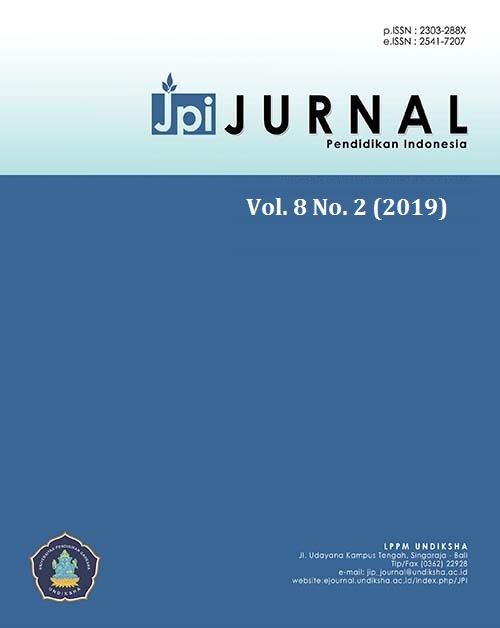Assessment and Intelligence of The Mathematical-Logical in Learning Computer Programming
DOI:
https://doi.org/10.23887/jpi-undiksha.v8i2.17578Keywords:
portfolio assessment, project assessment, mathematical-logical intelligence, learning outcomes computer programmingAbstract
The research objective was to determine the influence of assessment types and mathematical-logical intelligence on computer programming learning outcomes after controlling numerical aptitude. Data were analyzed by analysis of covariance (ANCOVA) two lanes with one covariate. Results showed that 1) the results of learning computer programming students who attended the learning process with the assessment portfolio was higher than students who attended the learning process with the assessment project, 2) on a group of students who had high the intelligence mathematical-logical, the result of learning computer programming was most suitable to follow the process with portfolio, and 3) on a group of students who had a low mathematical-logical intelligence, computer programming learning outcomes was most suitable to follow the process with the assessment. Research to use the type of portfolio assessment in the learning process in order to improve student results.
References
Bruning, James L. 1977. Computational Handbook of Statistics. United State of America: Scott, Foresman and Company.
Budiningsih, C. Asri. 2012. Belajar & Pembelajaran. Jakarta: Rineka Cipta.
Doran, Rodney, Fred Chan, dan Pinchas Tamir. 1998. Science Educator's Guide To Assessment. Virginia: National Science Teachers Association.
Gardner, Howard. 2003. Multiple Intelligences (Terjemahan oleh Alexander Sindoro). Batam: Interaksara.
Johnson, David W., dan Roger T. Johnson. 2002. Meaningful Assessment A Manageable and Cooperative Process. Boston: A Pearson Education Company.
Koyan, I Wayan. 2011. Asesmen Dalam Pendidikan. Singaraja: Undiksha Press.
Mahardika, I Made Sriundy. 2010. Pengantar Evaluasi Pengajaran. Surabaya: Unesa University Press.
Mandiartha, I Wayan. 2011. “Menyusun Tes Prestasi Belajar Biologi Berbasiskan Standar Kompetensi”. Makalah Seminar Ilmiah Penyusunan Tes Prestasi Belajar Berbasiskan Pola KTSP. Gerokgak.
Marhaeni, A.A.I.N. 2004. "Portofolio Sebagai Pendekatan Asesmen dalam Pembelajaran." Jurnal Pendidikan dan Pengajaran.
Martin, V. Maria Antoniate, dan T. Lucia Agnes Beena. 2012. "Prediction of Association among Numerical Aptitude, Programming Skills, Trait Emotional Intelligence on Students Performance." International Journal on Computer Science and Engineering (IJCSE).
Munandar, Utami. 1992. Pengembangan Bakat dan Kreativitas Anak Sekolah. Jakarta: Grasindo.
Nurkancana, Wayan. 1993. Pemahaman Individu. Surabaya: Usaha Nasional.
Plimmer, Beryl. 2000. "A Case Study of Portfolio Assessment in a Computer Programming Course." Proceedings of the NACCQ 2000. Wellington New Zealand: NACCQ.
Radili, Leny. 2009. lenyradili89.blogspot.com. http://lenyradili89.blogspot.com/ 2009/12/bakat-khusus.html (diakses 15 Mei, 2013).
Sanjaya, H. Wina. 2010. Kurikulum dan Pembelajaran. Jakarta: Kencana Prenada Media Group.
Sudjana, Nana. 2002. Penilaian Hasil Proses Belajar Mengajar. Bandung: Remaja Rosdakarya Offset.
Uno, Hamzah B., dan Satria Koni. 2012. Assessment Pembelajaran. Jakarta: Bumi Aksara.
Wortham, Sue C. 2008. Assessment in Early Childhood Education. New Jersey: Pearson Education, Inc.
Downloads
Published
Issue
Section
License
Authors who publish with the Jurnal Pendidikan Indnesia agree to the following terms:
- Authors retain copyright and grant the journal the right of first publication with the work simultaneously licensed under a Creative Commons Attribution License (CC BY-SA 4.0) that allows others to share the work with an acknowledgment of the work's authorship and initial publication in this journal.
- Authors are able to enter into separate, additional contractual arrangements for the non-exclusive distribution of the journal's published version of the work (e.g., post it to an institutional repository or publish it in a book), with an acknowledgment of its initial publication in this journal.
- Authors are permitted and encouraged to post their work online (e.g., in institutional repositories or on their website) prior to and during the submission process, as it can lead to productive exchanges, as well as earlier and greater citation of published work. (See The Effect of Open Access)








